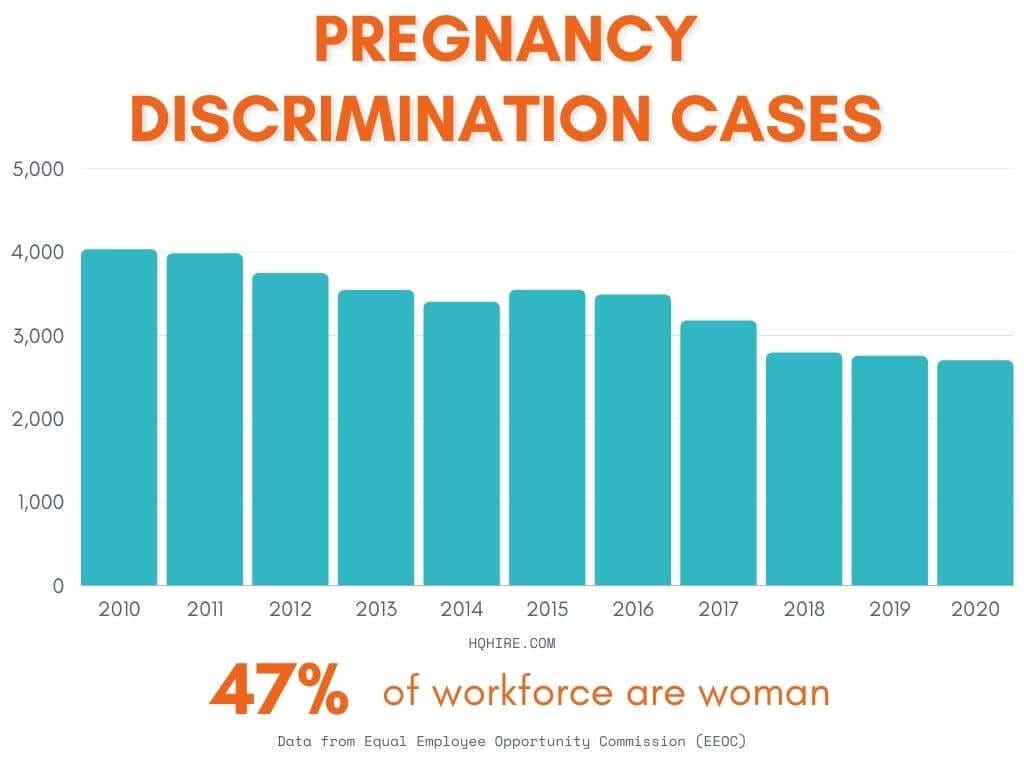Discrimination due to pregnancy or pregnancy-related reasons is against the law.
According to the United States Department of Labor (DOL), women aged of 16 and over-represents close to half (47.0%) of the total labor force.
Here are some surprising facts you should know about pregnancy discrimination!

1. Common types of discrimination due to pregnancy and maternity
Pregnancy discrimination is very real. In fact, here are some of the most common types of pregnancy discrimination.
- Getting fired because you are pregnant.
- Not getting hired because you are pregnant.
- Getting harassed for being pregnant.
- Demoted from your current position for being pregnant.
- Not being accommodated to pump breast milk.
- Pregnancy-related medical leave is not given.
- Getting retaliated by the employer for filing a discrimination claim.
I recommend you read more about the examples of workplace pregnancy discrimination.
Why?
Because it is important for us to identify and protect our expecting mothers from a workplace bullying.
Woman who are pregnant deserves a safe place to work as well!
2. Women who are pregnant are protected by law
The pregnancy Discrimination Act (PDA) was passed in 1978 to protect women who are pregnant.
PDA prohibits discrimination against all women on the basis of pregnancy, which includes:
- Treatment of employees due to pregnancy.
- Hiring decision made due to pregnancy.
- Firing decision made due to pregnancy.
- Promotion decision made due to pregnancy.
- Pay and other employment fringe benefits changes made due to pregnancy.
- Policies that may limit or prevent women from doing jobs because they are pregnant, or of childbearing age.
3. Not all workplaces are covered by PDA
Although the Pregnant Discrimination Act (PDA) is there to protect career women who are pregnant, PDA only covers workplaces with 15 or more employees.
In the event that you work at a company with less than 15 employees, you can approach the Regional Office of Women’s Bureau for assistance.
4. You are legally entitled to Maternity Leave.
Family and Medical Leave Act (FMLA) is a federal law introduced in 1993 by President Bill Clinton. FMLA allows pregnant employees the right to take time away from their job to take care of their newborn or newly adopted child.
FMLA leave is unpaid leave. However, the law allows the employee to use accrued paid vacation leave, and paid sick or family leave for some or all of the FMLA leave period.
When will you be eligible to use FMLA leave?
You are eligible to take up to 12 weeks of unpaid leave in any 12-months period when it is for the following purpose:
- For the birth of a newborn child.
- For care of a newly adopted child.
- For care of an immediate family member with a serious health condition. (Immediate family members included; spouse, child, or parents)
In addition, when you are ready to return to work.
Your employer must allow you to resume the same job you had before the leave.
This will include all the benefits and entitlements you had before your leave.
Furthermore, you will be entitled to receive your group health insurance during your leave.
5. Your employer cannot force you to take leave.
As long as you are able to perform your job while pregnant, your employer cannot force you to take leave.
Even when the employer believe that it is in the employee’s best interest, forcing a pregnant employee to take leave violates PDA.
Although it is advisable to take leave after giving birth to rest and recover your body.
An employer should not have a rule or policy to prevent you from coming back to work for a certain length of time after childbirth.
Nonetheless, you should always consult your doctor (Gynecologist) for health advice prior to returning to work.
6. You don’t have to tell your potential employer you are pregnant or plan to get pregnant.
Hiring decisions by the employer cannot be based on your pregnancy-related condition as long as you are able to perform the major functions of your job.
If your employer refused to hire you due to your pregnancy, he/she might have broken the law; Pregnancy Discrimination Act (PDA) is enforced by Equal Employment Opportunity Commission (EEOC).
Thus, these questions should never be asked by your potential employer:
- “Are you planning to get pregnant?”
- “Are you planning to have children?”
- “Are you pregnant?”
Unfortunately, it is very hard to prove that the reason you are not hired was based on your pregnancy.
Thus…
If you are still early in your pregnancy, you may choose to keep that information to yourself.
7. You are protected against retaliation by your employer.
You cannot be fired for filing a complaint against your employer if you believed that they have violated the Pregnancy Discrimination Act (PDA).
Here are some common retaliations:
- Firing of the employee.
- Demotion of the employee.
- Unfair performance review.
- Harassment in the form of verbal or physical.
If you are faced with any of these retaliations and believe it is a violation of PDA. You can seek help from Equal Employment Opportunity Commission (EEOC), which helps to deal with pregnancy discrimination.
Equal Employment Opportunity Commission (EEOC) has the power to overrule the company’s decision, or request the company to compensate you for the violation of the PDA.
So what can you do if you are discriminated against due to your pregnancy?
You may approach respective organizations for help:
- United States: Equal Employment Opportunity Commission (EEOC) for assistance.
- United Kingdom: Advisory, Conciliation, and Arbitration Service (ACAS)
- Canada: Canadian Human Rights Commission (CHRC)
- Australia: Fair Work Ombudsman
- Singapore: Association of Women for Action and Research (AWARE)
Up Next… Can you get fired from your job while pregnant?
“Pregnancy Discrimination? Is it real?”
Check out this video below!
Like this post?
Let us know in the comments below!
- 7 Examples of Pregnancy Discrimination in The Workplace (Need to Know)
- How to Deal with Pregnancy Discrimination at Work (Proven)
- 7 Things to Know about Pregnancy Discrimination at Work
- Can You Get FIRED From Your Job While Pregnant? (Answered)
- How to Resign During Bond Period Without Paying Bond? (Solved)
Join over 11,000+ achievers who are committed to achieving their career goals!






